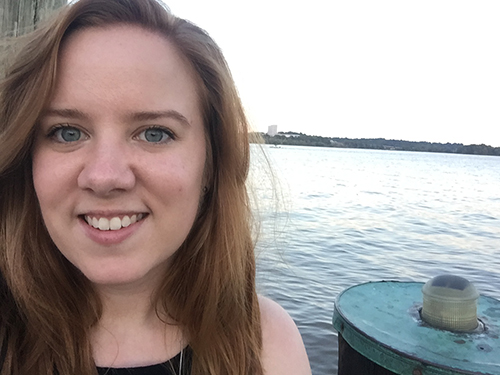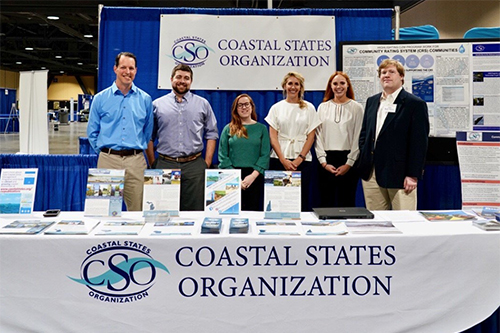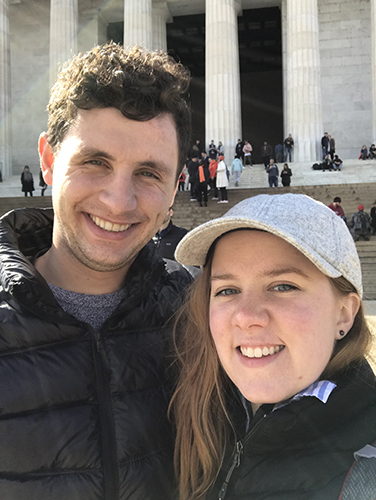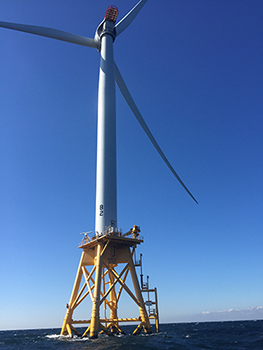Guest post by Bridget Faust, 2018-19 Wisconsin Sea Grant Fellow

Bridget Faust
I arrived at the Hall of the States first thing in the morning on April 2, 2018. As I walked up to the building, I glimpsed the top of the Capitol dome and couldn’t help but smile. I thought to myself, “I live here now. I work here now.”
It was my first day at the Coastal States Organization (CSO), and I was nervous. I quickly signed myself into the building, made my way up to the sixth floor, took a deep breath and walked into the office where I’d be spending about half my time for the next 15 months. The space was small. Three offices and three cubicles fit snugly inside. The walls were aquarium blue.
Days later, I repeated this exercise when I went to NOAA’s Silver Spring office for the first time. The sound of waves breaking in the wave pool that stands outside of SSMC4 told me that I was in the right place.
And so it began. After five years of working towards this fellowship opportunity, I was in D.C. serving as a Wisconsin Sea Grant Fellow in a joint position with NOAA’s Office for Coastal Management (OCM) and CSO.
During my time in D.C., I worked on a variety of things that OCM and CSO work on together and helped them to improve their coordination. This included supporting implementation of the National Coastal Zone Management Program Strategic Plan by coordinating the Digital Coast Resource for Coastal Managers webinar series, helping to run CSO’s Coastal Nonpoint Work Group, supporting the administration of the Coastal Nonpoint Pollution Control Program, and serving on the project team for an economic assessment scoping study of the National CZM Program.
Time passed more quickly than I could have imagined, and along the way, I learned some major lessons that I will carry with me for the rest of my career. I have summarized these lessons below for any recent graduate or graduate student who is considering applying to a fellowship program.

At the Restoring America’s Estuaries / Coastal States Organization summit in Long Beach, California.
Say yes to new and challenging opportunities.
During my time as a fellow, I was asked to take the lead on a number of tasks that pushed me outside of my comfort zone. For example, having never worked in the nonpoint source pollution realm, facilitating calls on the Coastal Nonpoint Pollution Control Program seemed like a daunting task. After all, I wasn’t an expert. How could I help states that have so much more experience? Working with the work group ended up being one of the most rewarding experiences of my fellowship, and I am so glad I ended up saying yes to the opportunity. Fellowships provide recent graduates with a rare chance to try new things! I would encourage future fellows to say yes when they are asked to try something new to benefit fully from this experience.
Know what you want to get out of your fellowship before you start.
Before I even started my fellowship, I outlined learning objectives and experiences that I wanted to gain with my career goals in mind. While I didn’t end up accomplishing all of them, knowing what I wanted to get out of my fellowship before I started allowed me to tailor my experience so it not only benefited OCM and CSO, but also allowed me to gain the skills that I needed to build my resume.
Ask questions, even if they seem foolish.

Exploring D.C. with my fiance, Josh.
This probably goes without saying, but the old adage is true: there’s no such thing as a stupid question. Almost a year into my fellowship, I made the mistake of assuming that staff didn’t need to register for a meeting that we were helping to plan. That’s how it had been at my last job, so why wouldn’t it be the same here, right? Wrong. I did need to register and by the time I asked the question, the meeting was just weeks away. Everything worked out in the end, but the stress of the situation could have been avoided had I just asked instead of making an assumption.

I had a chance to see the Block Island Wind Farm up close during a site visit for CSO’s fall meeting in Providence, Rhode Island.
The Wisconsin Sea Grant Fellowship was a once-in-a-lifetime opportunity to gain practical experience applying the skills I’d learned as a graduate student at UW-Madison.
It also helped to prepare me for the job I currently have today. Since July 2019, I have been working for CSS, a private sector firm in the environmental services industry, as a coastal management specialist on contract to NOAA’s Office for Coastal Management. I live and work from the Twin Cities area, which is home for me.
Aside from being in a different location, my day-to-day tasks have not changed significantly since my fellowship ended. I am still supporting National CZM Strategic Plan implementation and Coastal Nonpoint Pollution Control Program administration. I am part of the economic assessment project team, and I still work closely with my former colleagues at CSO. The only major difference is that I no longer formally wear a CSO “hat.”
In sum, I’d highly recommend one of Sea Grant’s many fellowship programs to current graduate or Ph.D. students who are looking for practical experience outside of academia!
Photo credits: All photos in story submitted by Bridget Faust.


